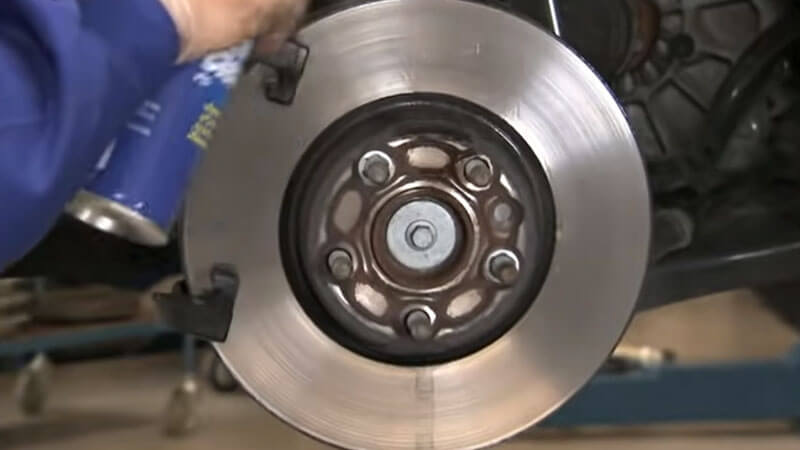If you’re like most people, you probably don’t give much thought to your car’s brakes. As long as they work when you need them, that’s all that matters, right?
Cleaning your brake pads and rotors is essential to maintaining your car. It is important to clean them regularly, as grit and dirt can build up and cause the braking system not to work as efficiently as it should.
This blog will cover several ways to clean your brake pads without taking the tires off your car.
What are the best ways to clean your brake pads without taking tires off?
Although removing your tires to clean your brakes properly is best, you can still do an excellent clean with the wheels on.
These are the best ways to clean your brake pads without taking your tires off.
1. Brake Cleaner
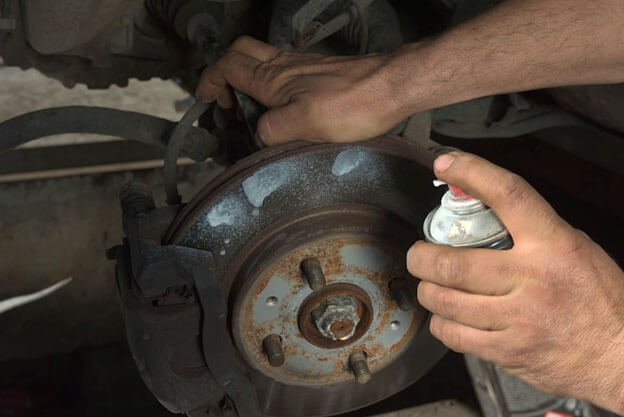
Brake cleaner is a great way to clean your brake rotors without taking them off. First, you must spray the brake cleaner on the rotor, ensuring you cover the entire area. After spraying brake cleaner on rotors, let it sit for several minutes. Afterward, you can rinse it off with normal water.
Before starting, ensure that your brake cleaner is ok to use on disc brakes and follow the manufacturer’s instructions when using the product.
The advantage of brake cleaner is that it’s easy to use and can reach hard-to-reach areas. Plus, it’s also effective in cleaning other parts of the braking system, such as the brake pads, calipers, and shoes.
Once you’re finished, if you find that there is still some remaining rust on the rotors, repeat the process until you’re satisfied with the result.
2. Daytona Brush
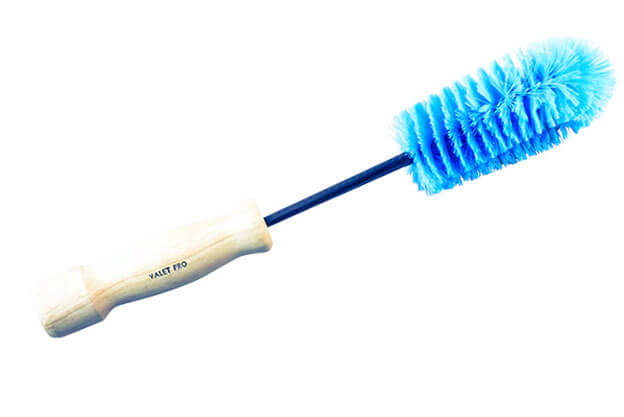
A Daytona brush is another great way to clean your brake rotors without taking them off. This brush is specifically designed for cleaning car parts, such as the brakes, but you can also use it to clean other parts of the car, such as the engine and the wheels.
The brush is made of nylon bristles that are stiff enough to remove stubborn dirt and grime but soft enough not to damage the surface.
To use the Daytona brush, simply wet the bristles with water and then scrub the rotor in a circular motion. After that, you can rinse it off with normal water.
3. Soapy Water
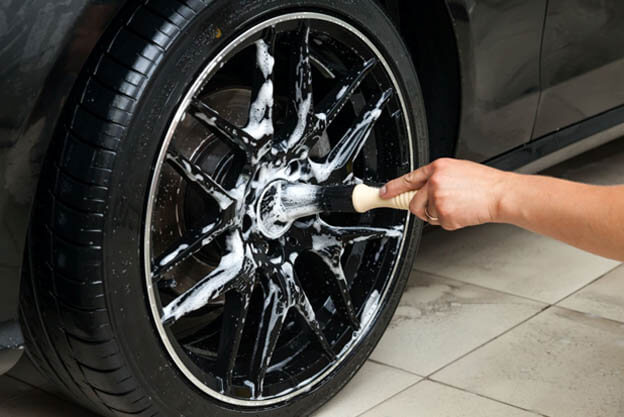
Using soapy water is one of the most economical methods of cleaning your brake rotors. All you need is a bucket of water and some soap. Mix them and apply the solution to the rotor with a clean rag.
You could also use a garden hose. Simply attach the hose to the spigot and spray the brake pads with water. This will help to remove any dirt or debris that may be clogging up the system. Be sure to spray the front and back of the brake pads and be careful not to get any water inside the brake calipers.
4. Pressure Washer
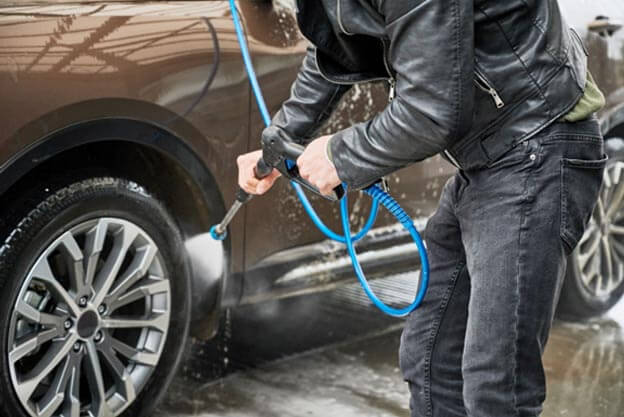
This is another excellent way to clean your brake pads if you have access to a pressure washer or power washer. But, again, be sure to spray both the front and back of the brake pads, making sure not to get any water inside the calipers.
The power washer will apply pressure on the rotors, which will help remove any soap, debris, or brake dust. After that, just let the rotor dry and remove any excess water with a clean rag to prevent rusting.
5. White Vinegar
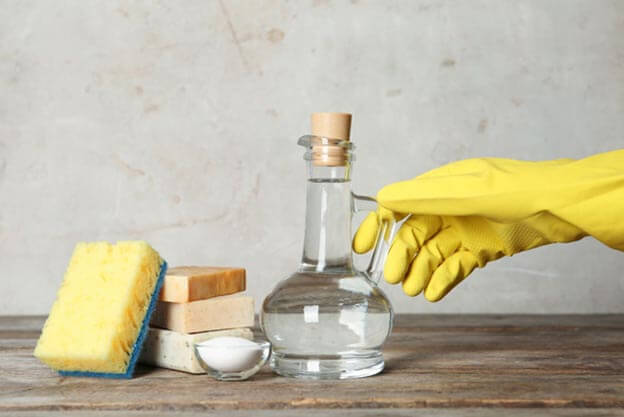
Using white vinegar is another method of cleaning your brake rotors without taking them off. Simply mix a solution of water and vinegar in a spray bottle to apply it liberally to the rotor. Let the vinegar sit for a few minutes before rinsing off with water and a clean rag.
If you’re still having trouble getting your brakes clean, saturate the entire brake system, including pads, calipers, shoes, etc., with pure vinegar. Then, after about 5 minutes, rinse off with clean water.
6. Baking Soda
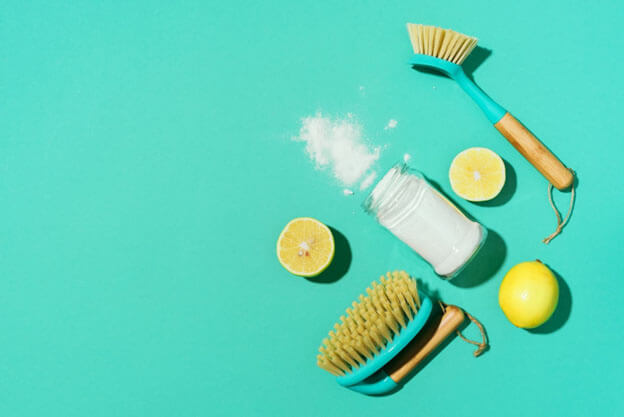
You can also use baking soda to clean your brake rotors without taking them off. All you need is a bowl of baking soda and water. Mix them to form a paste and apply it to the rotor with a clean rag. Let it sit for about 15 minutes, and then use a hosepipe to rinse it off.
You can also use a brush to scrub any stubborn dirt or grime. After that, let the rotor dry thoroughly before turning the tires on.
If your brakes are functioning properly but are still making some noise after cleaning, you could try applying a product like a disc brake quiet spray. It is a liquid you spray on your brake pads, which helps to keep the noise down. You can find this product at most auto parts stores.
To use, spray it on your rotors and allow it to dry. You can then wipe it off with a clean cloth. This product is safe for all types of brakes, including disc and drum brakes.
The Wrap-Up
Cleaning your brake pads regularly is essential for ensuring that they function correctly and stopping your car in a timely manner. While there are several ways to clean them without taking them off, each has its own set of benefits and drawbacks. Try out different methods and see which one works best for you.
If you’re still having trouble getting your brakes to work properly, it may be time to replace the pads or discs.
Keep these things in mind when cleaning your brake pads to keep your car safe on the road.
If you have any tips or suggestions on how to clean brake rotors, feel free to share them with us in the comments section below. Thanks for reading!
FAQ
Cleaning your brake pads regularly has many benefits. It helps remove dirt and dust that can build up over time and cause your brakes to stop working properly. It also helps keep your car’s braking system clean and functioning well.
You should clean your brake pads regularly to keep them clean and work well. Dirty brake pads can cause your brakes to stop working properly, so it’s essential to clean them often. We recommend cleaning your brake pads at least once per year.
If your brakes are still not working properly after cleaning them, you may need to replace the pads or discs. You should also check the fluid level in the reservoir to ensure optimal brake fluid level.
Brake cleaner can damage your tires if it is not used correctly. So be very careful not to get brake cleaner on your tires, and make sure to rinse them off entirely afterward.

